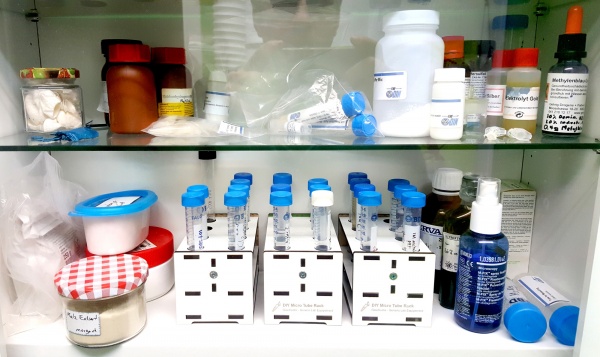WetWare
WetWare Shopping
For independent scientists or artists doing DIYBio it is not always easy to get the biomaterials and wet ware easily. Here is a list of shops that are hacker-friendly and cheap:
If you know a good store that you can recommend, please add it to the list.
"If you start to order reagents yourself, start by ordering something innocuous. This will allow you to be a registered customer without raising red flags. Then graduate to ordering the harder stuff. "Lab Making
Chemistry
Chemistry, good quality, cheap and big choice from ebay:
http://stores.ebay.de/s3chemicals/
Poll on FaceBook by Alex Kelly:
"Sunday morning question: What basic equipment/reagent/material have you struggled to obtain on the open consumer market?":
- Sucrose and amino acids from sigma, "sent to US residential adress for a legit company - but they insisted on an official lab"
- Chloral hydrate
- Beakers
- Methylamine
- Love
- Temperature regulators / thermostats. Julabo or Huber. "No second hand units available in Australia"
- pure ethanol -"believe it or not".
- Dichloromethane
- The common inorganic acids (e.g. conc H2SO4)
- Lithium acetate
- Methacrylic anhydride
- PEG in different molecular weights, PEG in 8000 and 3350
- Glacial HOAc
- Acetone AR
- 2-Hydroxy-4′-(2-hydroxyethoxy)-2-methylpropiophenone (Is a photoinitiator in case you're wondering.)
- NaOH solid (prills/pellets/whatever) (Must be AR, if I wanted Bunnings-grade I'd just buy it.)
- A lot of the acetate salts (and acid) tend to pop up a lot in molecular biology and biochemistry in buffers etc.
- HCl
- H2SO4
- Etehanol
- CaCl2
- MgCl2
- Cost-effective DNA dyes such as ethidium / GelRed / SYBR / whatever
- EDTA disodium dihydrate (sometimes people specify EDTA without specifying which salt and which hydrate, which is a pain because you don't specifically know what the counter ion is, or the molecular weight.)
- Glycerol, DMSO, MgCl2, CaCl2, EDTA, Tris
- Glycerol and DMSO
- Pure NaCl
- Agarose
- Agar
- Common media such as LB as well as individual components such as yeast extract and peptone etc.
- Premix common buffers such as TAE
- Common antibiotics e.g. ampicillin
- Dextrose
- L-Arabinose
- Organic solvents that don't leave residue when evaporated
- Ion-exchange resins for DNA workup, like Chelex sort of stuff.
- Chloroform and phenol.
- Isoamyl alcohol
- PCR Mastermix
- petridish
- Schott bottles (or clones) in a spectrum of sizes including the little 100ml ones.
- Stock microorganisms. Nothing dangerous but the common risk group 1 stuff. Like stock of Saccharomyces and K12.
- strains of mice
- Stock plasmids (e.g. common expression vectors, scaffolds, Cas9 templates)
- monopotassium phosphate and dipotassium phosphate
Thanks to everyone who helped compile this list...
"Perhaps some of us should start a business selling scientific supplies, reagents etc marketed towards citizen scientist, hackers etc.. Could sell cheap kits for open source hardware too".. (Leo Mason)
Chemical Purchasing list on sciencebuddies.org.
Molecular Biology
The ODIN - The Open Discovery Institute - ebe:
http://www.the-odin.com/
Good quality TAQ and home brewing of biomaterials:
https://www.geneandcell.com/
Agarose and Tubes from ebay:
http://stores.ebay.com/greenbioresearch/_i.html?rt=nc&_pgn=1&_ipg=48
Petri Dishes, pipette tips, PCR Tubes and other stuff. (No small quantities. Price is OK, but not really cheap)
Sarstedt, Switzerland:
https://www.sarstedt.com/home/
Laboratory Equipment, Life science, chemicals. (Not really cheap)
Carl Roth, Switzerland
https://www.carlroth.com/ch/de/
Biohacker.jp articles (in Japanese) on [where to buy reagents].
